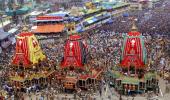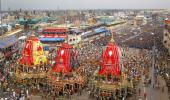The historic Lord Jagannath Rath Yatra at Puri will go on unhindered during the COVID-19 pandemic and commence on Tuesday with the Supreme Court Monday modifying its restrain order to permit the centuries old tradition with certain conditions, including no public attendance.

The apex court allowed holding of Rath Yatra after taking note of the Odisha government's assurance that it 'can be held in a limited way without public attendance'.
Modifying its June 18 order by which it had said that this year's Puri Rath Yatra cannot be permitted due to coronavirus pandemic, a bench headed by Chief Justice S A Bobde, directed Odisha government to impose curfew in Puri city during the time when chariots are taken in procession.
The bench, also comprising Justices Dinesh Maheshwari and A S Bopanna, said that each Rath would be pulled by not more than 500 people and all of them have to be tested negative for coronavirus.
It directed that those engaged in pulling the chariot shall maintain social distancing before, during and after the Rath Yatra.
While the Rath Yatra festival, held over 10-12 days and was attended by lakhs of people participating, is scheduled from June 23, the 'Bahuda Jatra' (return car festival) is fixed for July 1.
Three heavily-built wooden chariots of Lord Jagannath, Lord Balabhadra and Devi Subhadra are traditionally pulled by thousands of devotees over a distance of three kilometres twice during the nine-day festival of the Trinity at Puri.
'Indeed, if it is possible to ensure that there is no public attendance, we see no reason why the Rath Yatra cannot be conducted safely along its usual route from temple to temple,' the bench said in its order.
The state government had filed an affidavit and said that it might be possible to conduct the Rath Yatra in a limited way without public attendance, the bench noted in its order and added that 'this has been proposed by Gajapati Maharaj of Puri, who is the Chairman of the Puri Jagannath Temple Administration'.
The top court passed the order on a batch of applications seeking intervention and modification of its June 18 order.
'All entry points into the city of Puri, i.e., airports, railway stations, bus stands, etc., shall be closed during the period of Rath Yatra festival,' the bench said in its order.
'During the period of curfew no one would be allowed to come out of their houses or their places of residence, such as, hotels, lodging houses, etc. To start with, the curfew shall begin tonight at 8 pm,' the bench said.
The top court said these 500 persons who will pull the chariot will include officials and police personnel and there shall be an interval of one hour between two chariots.
"Each of those who is engaged in pulling the chariot shall maintain social distancing before, during and after the Rath Yatra," the bench said while directing that only such persons shall be associated with the rituals who have been found to tested negative for COVID-19 and shall maintain social distancing.
"The primary responsibility for conducting the Rath Yatra in accordance with the conditions and other norms shall be that of the committee in-charge of Puri Jagannath Temple Administration.
"Each member of the committee shall be responsible for due compliance with the conditions imposed by this court and the general directions which govern ensuring of public health issued by the Union Government. In addition, the officers designated by the State Government for conduct of the Rath Yatra shall be responsible likewise," the bench said.
It directed that the rituals and the Rath Yatra shall be 'freely covered' by the visual media and the state shall allow TV cameras to be installed at such places as may be found necessary by the TV crew.
"The bare minimum number of people shall be allowed by the committee to participate in the rituals and in the Rath Yatra. We take a note of the fact that the state of Orissa has a good record of having controlled the pandemic with a very little loss of life. We see no reason why the same attitude of care and caution should not be applied to the Rath Yatra," the bench said, adding that the state may take necessary help from the Centre.
The bench noted in its order that Solicitor General Tushar Mehta has assured that the Centre shall offer all assistance and help to the state in this endeavour.
"The state government shall maintain a record containing details of all those who have been allowed to participate in the Rath Yatra or the rituals connected therewith along with details of their medical conditions after testing," the bench said.
In its order, the bench noted that though it does not have the official copy of the gazette itself, it was informed that in the 18th-19th century a yatra of this kind was responsible for the spread of cholera and plague 'like wild fire'.
"We say this in order to remind the authorities concerned that the situation can become dangerous if the rules of caution are ignored," it said.
Justifying the circumstances in which the June 18 order was passed, the top court said on that day it had asked the authorities whether it was possible to allow the procession of chariots to go without general congregation.
"We were informed that it would be well-nigh impossible to ensure that there is no congregation. This court was, therefore, left with no option but to grant an injunction restraining the Rath Yatra itself," the bench said.
The order disallowing the centuries-old Lord Jagannath Rath Yatra at Puri was passed on June 18 as it was told by the authorities concerned that it was 'impossible' to conduct the religious event without 'congregation', the Supreme Court said.
The CJI referred to the proceedings of June 18 that had led to passing of the restraint order in which it had said that in the interest of public health and safety of citizens due to the pandemic, the 'Yatra' cannot be allowed.
'Before we passed our earlier order we had suggested to the parties that the procession of chariots, that is, the Rath Yatra itself, could be allowed to proceed, however, without the general congregation which participates in this Yatra.
'We were informed that it would be well nigh impossible to ensure that there is no congregation. This Court was, therefore, left with no option but to grant an injunction restraining the Rath Yatra itself,' the top court said in its order.
'We had restrained the respondents from holding the Rath Yatra this year in view of the danger presented by gathering of 10 to 12 lakhs devotees for a period of 10-12 days. Clearly, any spread of the Coronavirus due to the Rath Yatra would be disastrous due to the large number of persons and the impossibility of tracking all the infected people after they have gone back to their respective homes. Needless to say that it is not possible to screen the medical conditions of all those who converge on the cities for the Rath Yatra,' it said.
It also referred the submission that in the 18th-19th century, a yatra of this kind was responsible for the spread of cholera and plague 'like wild fire'.
- Read the full SC order HERE










